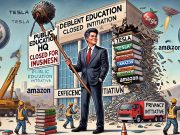Navigating the UK’s Fiscal Tightrope: Balancing Act in Troubled Times
The United Kingdom stands at a critical juncture, akin to a performer balancing precariously on a taut tightrope. The stakes are high, the audience is watchful, and the performer in this scenario is none other than the UK government, with the Chancellor of the Exchequer, Rachel Reeves, as the lead balancing act.
As the UK prepares for another round of spending cuts, the nation collectively holds its breath. Citizens, businesses, and parliamentarians alike are all invested in understanding how these financial measures will influence their lives and the broader economic climate.
The Context: A Precarious Economy
The UK’s economy, much like that of its global counterparts, is navigating turbulent waters. Inflationary pressures, compounded by global supply chain disruptions and the lingering impacts of the pandemic, have created a unique set of challenges. The government faces the unenviable task of reining in public debt while stimulating economic growtha conundrum reminiscent of walking a tightrope.
The Dual Challenge: Debt and Growth
Austerity is a word that sends shivers down the spines of many in the UK, conjuring memories of previous waves of cuts that left indelible marks on public services. Yet, as Reeves sharpens her fiscal tools, the question lingers: How does one reduce debt without stymieing economic momentum?
Debt reduction requires prudent spending, yet too much caution can stifle growth. The government must balance these competing priorities with precision, ensuring that essential services are protected while paving the way for economic recovery.
Public Services: The Heart of the Debate
The health of public services remains at the forefront of discussions on spending cuts. Education, healthcare, and welfare programs are all critical facets of the social fabric. As potential cuts loom, concerns over their impact on everyday citizens grow. The challenge lies in enacting measures that preserve the integrity of these services while fulfilling fiscal commitments.
Innovation and Opportunity
In these times of austerity, innovation could become the government’s greatest ally. By investing in technology, renewable energy, and skills training, the UK can unlock avenues for growth that were previously untapped. Embracing such opportunities requires foresight and a willingness to adapt to change.
A Collective Responsibility
While the government bears the burden of decision-making, the responsibility of navigating this fiscal tightrope extends to every individual and corporation. Through collaboration and resilience, the UK can forge a path that leads to economic stability and prosperity.
Conclusion: Balancing for a Brighter Future
The UK stands at a pivotal moment where caution must be balanced with ambition. As Chancellor Reeves prepares to unveil the forthcoming spending cuts, the nation waitshoping for a strategy that safeguards the present and invests in the future.
This delicate act, akin to that of a tightrope walker, demands precision, vision, and a steady hand. As the UK ventures forward, let us hope that this balancing act not only steadies the economy but also imbues it with renewed vigor, paving the way for a resilient and thriving future.






















